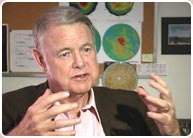
 File size : 3.4MB Format : MPEG |
Q. Why do you need planetary exploration? Why should we worry about the planets? We have this earth here. And of course the same thing was said when people lived in a small part of Asia and a small part of Europe and some people wanted to go look for other places. And others said, "Why worry, we know all there is to know?" Well, that wasn't true. So when the great explorations took place of North America and South America, of Australia and of distant parts of Asia, the whole world was changed, our knowledge changed. It's not a place that people need for building houses or subdivisions. But the knowledge that's there is so important. Knowledge of our climate, for example, and the knowledge of the history of climate is very important. It's also important to understand resources. So I think the same thing applies when you go to other planets. First the moon, but especially to Mars, which is very similar to earth in its basic chemical make up and the other planets. |
|||||||||
 File size : 11MB Format : MPEG |
Q. In the next 20 years what role do humans have in planetary exploration. What can we expect to see in the next 20 years? Well, in trying to think about the future of exploration, there's a fundamental logical contradiction. If we knew what we were going to find it wouldn't be exploration. And that's really true. And certainly our experience so far says that over and over again. So you can talk about some things that are likely but you might miss the most important thing, which you couldn't have forecasted. I think what is likely is that we will find, in the case of Mars, that there is accessible water. The history of the planet involves a lot of water. It will become possible to test the idea that microbial life is there now or might have been there earlier. But we can only test it in a limited air near the surface. We can't find out much about the deep situation. But I think 20 years from now when people say life on Mars. It will be very exciting. That's very significant to us because so far we have no sample of life of any kind, from any other planet place in the universe. And so is life only on Earth? Are we it? Is this the best that God could do was to create this place? Or is life as some people think of it a very common element of stars and planets? So it's pretty important to try to get a good answer as to whether it's there. I think the second thing that will be happening by then is that there will be big discoveries about the giant planets, Saturn and Jupiter. A big mission arrives at Saturn in 2004 with a probe and an orbiter and many, many different kinds of instruments, and almost surely there will be a whole flood of new ideas and discoveries. And then there will be more missions to the outer planets. So to some extent as well as the focus on Mars I think the focus is going to move to the outer planets and to the small bodies, the asteroids, especially the asteroids that in close to the Earth. Japan has a very important mission, the Hayabusa (MUSES-C) will attempt to land on an asteroid and actually try to recover a sample and bring it back. This is a very, very difficult mission. In that sense, Japan is attempting something no other country has tried before. It's risky but it's terribly important. But I think it's very important that we get more information about these little less dramatic objects because they're on paths that can hit the Earth. And also over time, these are neighbors that we need to understand very well, where they come from, how did they get there and more and more about their orbits. So I think that's going to be a focus also in the next 20 years.
[ Interview : October 1, 2003 ]
|
|||||||||
